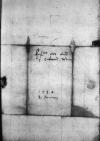List #1102
Andrzej KRZYCKI (CRICIUS) do Ioannes DANTISCUSPiotrków, 1534-01-23
| odebrano [1534]-01-31 Rękopiśmienne podstawy źródłowe:
Pomocnicze podstawy źródłowe:
Publikacje:
| ||||||||
Tekst + aparat krytyczny + komentarzZwykły tekstTekst + komentarzTekst + aparat krytyczny
Reverendissimo meo Domino Culmensi etc.
Reverendissime mi Domine observantissime.
Occupatissimus hic in scribendis negotiis conventualibus cogor esse brevior, quam vellem, scribam tamen ex
Non placuerunt hic nobis omnibus, quae reverendissimus dominus archiepiscopus scripsit Reverendissimae Dominationi Vestrae, multo minus, quae scripsit dominus
Reverendissimae
D(omination)i or D(ominationis)⌈D(omination)iD(omination)i or D(ominationis)⌉
Vestrae addictus
Postscript:
Quoad


 AAWO, ABD67, f. 270v
AAWO, ABD67, f. 270v